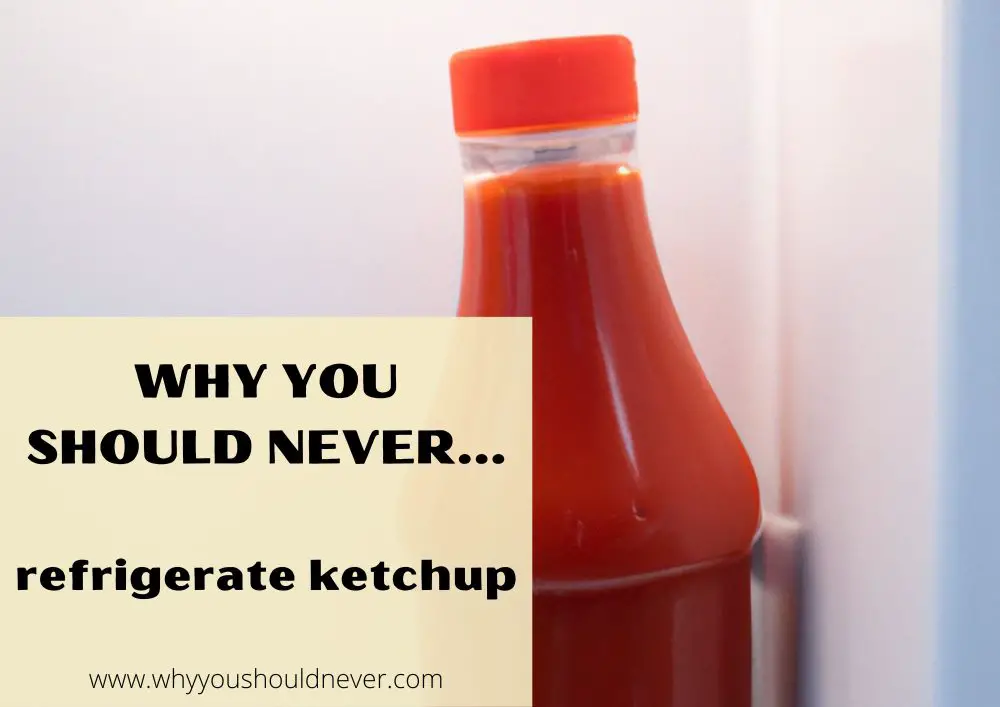![]()
Why You Should Never Refrigerate Ketchup
Ketchup, the world-renowned condiment that goes with just about everything, is a staple in most households. Whether you’re a fan of fries, burgers, hot dogs, or eggs, ketchup is always there to enhance the flavor of your favorite foods.
And because we all love it so much, our first instinct might be to toss it in the fridge to keep it fresh for as long as possible. After all, refrigeration is what we do to preserve many perishable items, so why not ketchup?
Well, actually, there are a number of pretty valid reasons why putting ketchup in the fridge isn’t wise. Let’s explore some of those reasons below.
6 reasons why you shouldn’t refrigerate ketchup
1. Ketchup doesn’t need to be refrigerated
One of the most important things to understand about ketchup is that it doesn’t actually need to be refrigerated. The high levels of vinegar and preservatives in ketchup make it shelf-stable, meaning it can be stored at room temperature without spoiling for up to a year.
Most ketchup will be consumed well before that year-long mark, so there’s really no need to keep it in the fridge.
2. Cold temperatures can cause separation
When ketchup is exposed to cold temperatures, it can cause the ingredients to separate. This means that the water content in the ketchup will freeze and expand, pushing the other ingredients apart and causing an unappetizing mess.
This separation can also cause the ketchup to lose its signature thickness and texture, making it less enjoyable to use.
3. It can slow down the flow
Ketchup is already a thick condiment, and refrigeration could make it thicker. This happens because the cold temperature causes the vinegar and other ingredients to congeal, making it difficult for the ketchup to flow out of the bottle.
Seeing as most people don’t want to spend minutes trying to coax ketchup out of a bottle, it’s best to keep it at room temperature for optimal consistency and flow.
4. The flavor will suffer
When ketchup is stored in the fridge, sooner or later, it’s going to take on the flavors of other items in there, such as onions, garlic, and other pungent foods. And boy is that unpleasant! I learned this the hard way, unfortunately.
Once this happens, you’re not getting that horrible taste out of it, no matter how much you try.
Additionally, cold temperatures can dull the flavors of ketchup, making it less vibrant and tasty than when it’s kept at room temperature.
5. It takes up unnecessary space
Refrigerators are already packed with various items, and adding a bottle of ketchup to the mix just takes up valuable space. You can usually find a spot in your pantry or on your countertop to store your ketchup, freeing up room in your fridge for items that actually need to be refrigerated.
6. It will be too cold
Lastly, let’s not forget that eating cold ketchup just isn’t as enjoyable as eating it at room temperature. The cold temperature can deaden your taste buds and suppress the flavors of the food you’re pairing it with.
Also, there’s a possibility that you’ll get a false sense of security when pairing cold ketchup with hot food. The cold ketchup might give you the impression that the food is cooler than it actually is, causing you to accidentally burn your mouth.
Unless you live in a very hot and humid climate, there’s really no need to refrigerate your ketchup. As long as you store it in a cool, dry place away from direct sunlight, it should remain fresh and tasty for several months.
Keeping it at room temperature will ensure that the consistency and flavor remain at their optimal levels, making it all the more enjoyable to use.
